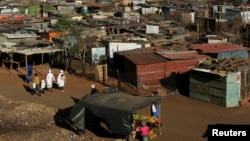Having won this year's election with more than 60 percent of the vote, South Africa's ruling ANC party -- in power for 20 years now -- is under renewed pressure to help the country's poor black majority. Thuso Khumalo, director of South Africa's Broad-Based Black Economic Empowerment (BBBEE) program, as well as experts, have differing opinions on whether this program can ease inequality in South Africa.
From 1948 to 1994 South Africa went through apartheid, a brutal segregation system imposed by the country's white minority. Under the system, black Africans and other non-whites were forced off their land and driven into bantustans, areas where they were totally disconnected from the country’s economy.
Since winning power 20 years ago, the ANC has struggled to fix the inequalities created by the system. Twenty-three million of the country’s 51 million people still live below a poverty line of $58 per month and more than 16 million of these are surviving on government grants.
In addition, whites still control 80 percent of the country's land and 90 percent of the top 100 companies in the Johannesburg stock exchange.
This has caused anger among the country’s black majority, who blame the government for failing to ensure they have a fair share of the country’s economy.
But the government said its revitalized Black Economic Empowerment (BEE) program, now under the new name Broad-Based Black Economic Empowerment (BBBEE), was the answer to these challenges.
Incentives
The program provides incentives for companies to employ more blacks, promote them to management positions and give them shares in the firms they work for.
Companies are also given points for developing the skills of black workers and buying their supplies from black-owned firms.
Nomonde Mesatywa, who is chief director of the BBBEE in the Department of Trade and Industry, said the program could level out the inequality in South Africa's economy.
“It’s a redress program, in terms of restructuring the economic landscape by making sure that the patterns of ownership don’t remain in the minority but rather the black people start to participate effectively by owning shares and equity in big conglomerates that operate in the country,” said Mesatywa.
Some companies have been hesitant to implement the BBBEE codes as there are no penalties for failing to comply.
However, Mesatywa said large companies had a lot to gain if they complied with the BBBEE legislation.
“Obviously it gives them opportunity to benefit from government contracts and government procurement, because as you know generally the government is the biggest procurer of goods and services, so we are saying that, that it's like an incentive for companies, but beyond that the fundamental principle is that you contribute to the economic, social well-being of the country,” said Mesatywa.
Criticism
But this program has been criticized for enriching only a few politically elite.
Mashego Maleka, the CEO at Zenzele Technology Incubator, a company whose aim is to economically empower disadvantaged blacks, said BBBEE was a good program but its implementation needed to be revised.
“On the same time when there are the few that are benefiting, the bulk are burning the country, we have got black guys with mining rights, they cannot get funding because they can’t find market. So for 20 years if you have got a mine, you want to export iron, you want to export coal, you can’t because you haven’t got a slot,” said Maleka.
Anton Baumann of Transcend Capital, a corporate finance house specializing in black economic empowerment transactions, said for BBBEE to be successful, trusts and charitable organizations should be brought in as partners in the ownership structure of companies.
“And the objectives of these foundations, trusts, could be either employee related, socioeconomic development related from addressing the poorest of the poor, building schools, hospitals, etc, or enterprise development related not an individual,” said Baumann.
Mesatywa said by encouraging companies to support entrepreneurs, skills training and employee ownership, the program would go a long way toward reducing the poverty and unemployment still affecting South African blacks.




